MercoPress. South Atlantic News Agency
Politics
-
Sunday, June 24th 2012 - 02:43 UTC
Germany’s Bild newspaper becomes 60 and celebrates with 41m circulation

Germany's best-selling newspaper was given away free to almost all of the country's 41 million households on Saturday in a controversial celebration of the daily's 60th anniversary that set a world record for largest circulation.
-
Sunday, June 24th 2012 - 02:27 UTC
Franco: “no coup, a change of leadership”; Germany admits new government
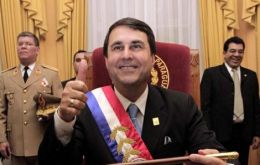
“There is no coup here,” assured the new president of Paraguay Federico Franco on Saturday, who acted confidently before the international press following the ousting of Fernando Lugo on Friday.
-
Sunday, June 24th 2012 - 02:22 UTC
Argentina withdraws ambassador from Paraguay: Mercosur decides next week
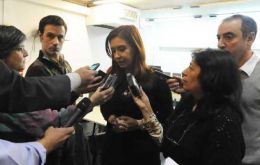
Argentina is withdrawing its ambassador to Paraguay because of the rapid impeachment of former Paraguayan President Fernando Lugo, the Foreign Ministry said in a statement.
-
Saturday, June 23rd 2012 - 07:53 UTC
US demands Argentina “immediately” ends the import licensing regime

The United States demanded on Friday that Argentina “immediately” end an import licensing regime and other curbs that have frustrated foreign suppliers while also expressing concerns about a “sweeping new import restriction” that Indonesia has imposed.
-
Saturday, June 23rd 2012 - 07:39 UTC
EU leaders agree growth measures but remain divided on mutualized bonds issue
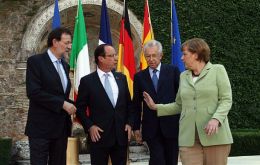
The leaders of Germany, France, Italy and Spain agreed Friday on a 130 billion Euros package to try to revive economic growth in Europe but differed over whether and how to launch joint bonds to combat the Euro zone's debt crisis.
-
Saturday, June 23rd 2012 - 03:48 UTC
Franco promises to uphold democracy and honour international agreements

Paraguayan vice-president Federico Franco, 49, was sworn-in on Friday afternoon as president following Fernando Lugo’s impeachment that had him removed in less than two days.
-
Saturday, June 23rd 2012 - 03:43 UTC
“A coup against democracy” organized by the political class and mafia claims Lugo
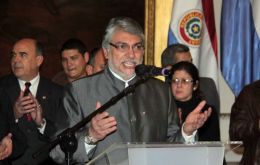
Ousted Paraguayan President Fernando Lugo addressed thousands of citizens outside the presidential palace and assured there had been a “coup against democracy” but also said he would respect the formality of the Senate’s decision and called on followers to march peacefully.
-
Saturday, June 23rd 2012 - 03:35 UTC
Uruguay hosts highest Chinese official to ever visit the country
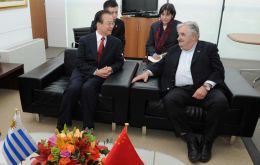
Chinese Premier Wen Jiabao arrived in Uruguay Friday, his first stop on a multi-nation visit to South America. Wen's arrival marks the first time a Chinese premier has visited Uruguay since diplomatic ties were established in 1988.
-
Saturday, June 23rd 2012 - 03:25 UTC
Mercosur/Unasur anticipate “appropriate measures” against coup in Paraguay
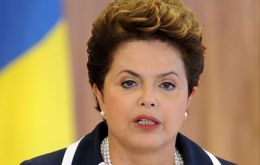
President Cristina Fernández assured on Friday night that “Argentina does not condone the coup in Paraguay” and anticipated that “appropriate measures” will be taken at next week’s Mercosur Summit, scheduled to take place in Mendoza.
-
Friday, June 22nd 2012 - 22:41 UTC
Hot air about the Falkland Islands reaches the UN

By John J. Metzler (*) At the time of the 1982 invasion, Argentina was run by a military junta who unwisely played the nationalism card and seized the islands 300 miles off the coast of South America.
